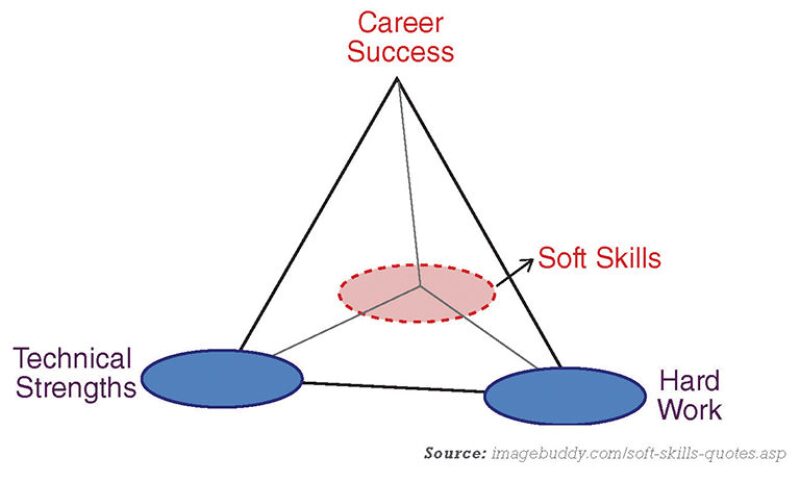From the exploration and production of oil and gas to the ultimate distribution of petroleum-based products to customers, the oil and gas industry is global and multidisciplinary. The global nature of the industry is reflected in the membership of SPE: Professional members of SPE live in 147 countries, and a review of the student membership suggests that the Society will become even more diverse in the years to come.
Given that mergers and acquisitions are the global climate in the industry today, as a young professional, how do you feel about change? Do you feel confident that your job is secure and you have room for growth, or are you worried? It is inevitable that change will be part of your future in this industry, and soft skills hold the key in helping you successfully navigate it.
If you imagine yourself standing in front of a pyramid face (Fig. 1), there is something that you cannot see—the third corner at the back of the pyramid. But without it the pyramid cannot stand. Such is the role that soft skills play in career success.

Take the case of a major professional sports team with highly paid players. They all want to win, but sometimes they let their own importance get in the way of the team’s success. Diversity is having a team of players, each with his or her own unique level of physical capabilities and experiences. Inclusion is all of the team members, including the star players, accepting the talents, strengths, and experiences of others, along with the insight of the coach, to move the team to a higher level of excellence.
Embracing Diversity and Inclusion
Diversity and the ability to accept, adapt, and change with the global climate of the industry is a gift that not every person possesses. To appreciate a gift, you have to understand how valuable it is to you.
In a 2014 Ernst & Young series called “The DNA of the COO: Time to claim the spotlight,” a report titled “An oil and gas sector perspective” states that mergers and acquisitions are on the rise as oil and gas companies seek to divest noncore assets.
Three-quarters of the chief operating officers polled for the report said that highly developed leadership qualities and interpersonal skills are the most crucial attributes to success, while 60% emphasized communication and influencing skills. These are professional people in charge of the operations of major oil and gas companies who cited soft skills as a large percentage of the most important attributes they needed to be successful.
Few petroleum engineers work alone. Oil and gas projects are complex and often require large teams. It is common to find participation from engineers, scientists, technologists, and business professionals in a team. The global nature of our industry demands that individuals from different cultures and backgrounds transcend their differences to form a cohesive work group.
To contribute in this work environment, petroleum engineers must understand that their technical contributions alone are not sufficient. Without the soft skills to collaborate in a diverse workplace, you will not be effective and the impact of your technical contributions will be limited. Studies published in other engineering disciplines also show that one of the keys to career success for engineers is to develop and hone communication skills, ethics, teamwork, and other interpersonal skills (Kumar and Hsiao 2007).
Diversity Drives Innovation
If you aspire for a leadership position in the industry, go beyond being capable of working in a diverse team to leveraging team diversity to drive innovation. Research shows that the best solutions are developed by diverse teams in which individuals from different generations, and with different backgrounds, experiences, and approaches collaborate to create solutions that none of them individually could develop.
In his book, The Medici Effect: What Elephants & Epidemics Can Teach Us About Innovation, Frans Johansson, a business strategist who emphasizes innovation, argues that extraordinary innovations occur when ideas and concepts from diverse industries, cultures, departments, and disciplines collide. In other words, great leaders not only understand the value of diversity, but they also actively seek it and embrace it.
According to Scott E. Page, a professor at the University of Michigan and the author of The Difference: How the Power of Diversity Creates Better Groups, Firms, Schools, and Societies, in solving problems and making predictions, “diversity matters just as much as ability.”
For problem solving, especially in times of mergers and acquisitions, diverse teams bring different approaches so that when one person gets stuck, another finds an improvement. Diverse perspectives result in diverse predictive models and improve the team’s analyses. Wise leaders realize that working effectively within a diverse team is the scenario that will deliver the best solutions.
Obtaining the value of diversity requires each team member to participate authentically. Each team member must recognize that different communication styles, problem-solving approaches, cultural values, life experiences, and expertise must be respected and included in the team dynamics. It must be anticipated that a new, diverse team will take longer to become effective than a homogeneous team. However, the additional time investment is rewarded by the far superior solutions a diverse team will be capable of generating.
Diversity and inclusion are more than soft skills. They are “foundational skills” necessary for career success. To begin your journey in building these skills, you are encouraged to attend the SPE Soft Skills Committee’s workshop on “Diversity: Focusing on the Value and Relevance in Global Business” during the SPE Annual Technical Conference and Exhibition on 29 September in Houston.
For more information about the workshop, visit http://www.spe.org/atce/2015/pages/schedule/soft_skills.php.
Reference
Kumar, S. and Hsiao, J. 2007. Engineers Learn “Soft Skills the Hard Way”: Planting a Seed of Leadership in Engineering Classes. Leadership and Management in Engineering 7 (1): 18–23.
Betty Shanahan is a consultant to the executive vice president of administrative services at Michigan State University. From 2002 to 2014, she served as the executive director and chief executive officer of the Society of Women Engineers. Before joining the society, she spent 24 years in development, engineering management, and marketing in the electronics and software industries. Shanahan holds a BS in electrical engineering from Michigan State University, an MS in software engineering from the Wang Institute of Graduate Studies, and an MBA in strategic management from the University of Chicago’s Booth School of Business.
Lori Dalrymple is the owner of Architecture of Communication, a company providing soft skills training for oil and gas industry professionals. She developed a global multicultural business training program aimed at increasing employees’ ability to understand and conduct business with customers and colleagues globally. Dalrymple also offers training in presentation skills and one-on-one communication skills for clients who speak English as a second language.
Rubén Caligari is a professor of petroleum engineering at the Instituto Tecnológico de Buenos Aires. He recently retired as a senior technical adviser of nonconventional resources from Petrobras. Previously, he worked for PESA, an energy company based in Argentina, and BJ Services. With more than 30 years of experience, he has served in several technical and managerial positions in exploration and production operations in Latin America. Caligari holds a petroleum engineering degree with honors from the Universidad Nacional de Cuyo in Argentina and is an alumnus of the University of Michigan’s Ross School of Business and the Universidad Di Tella in Argentina. A Distinguished Member of SPE, Caligari was its regional director for South America and the Caribbean in 2008.

